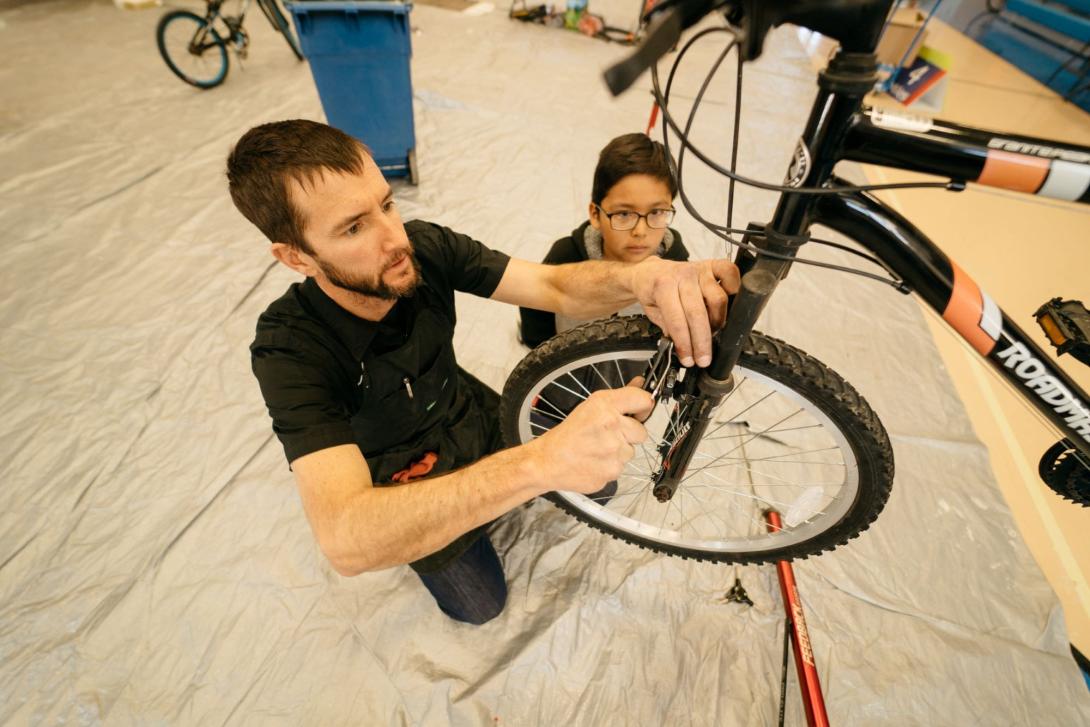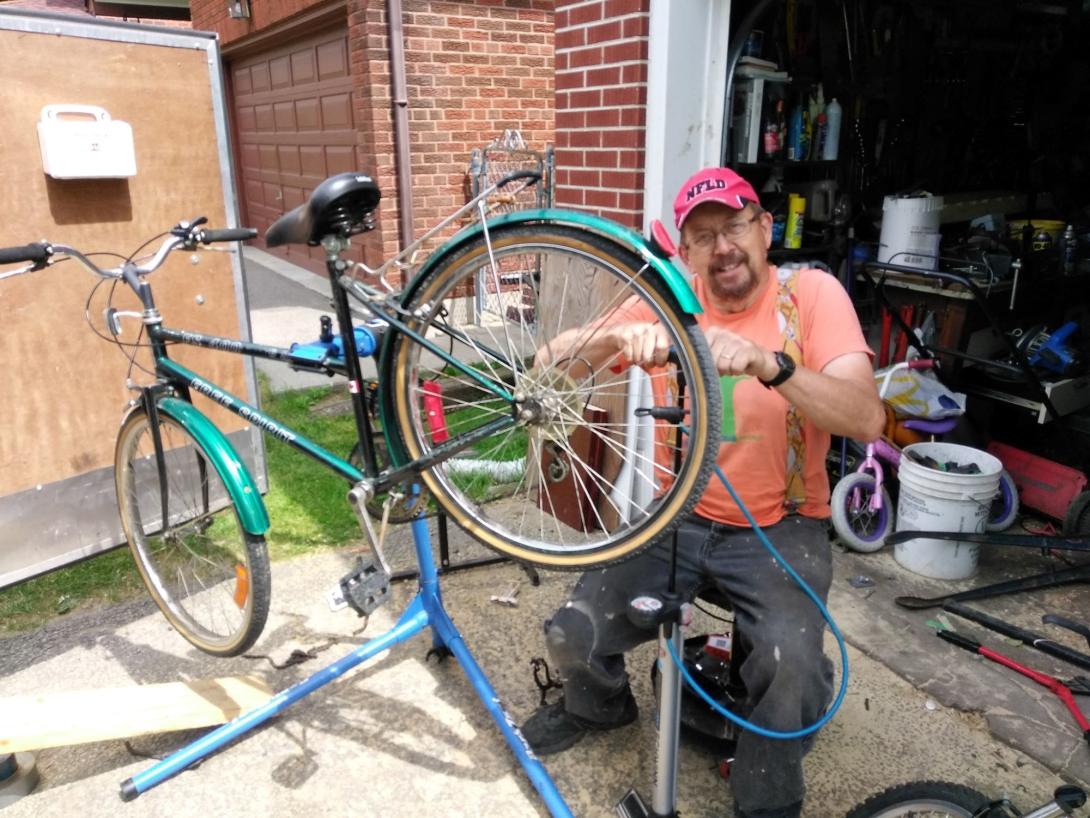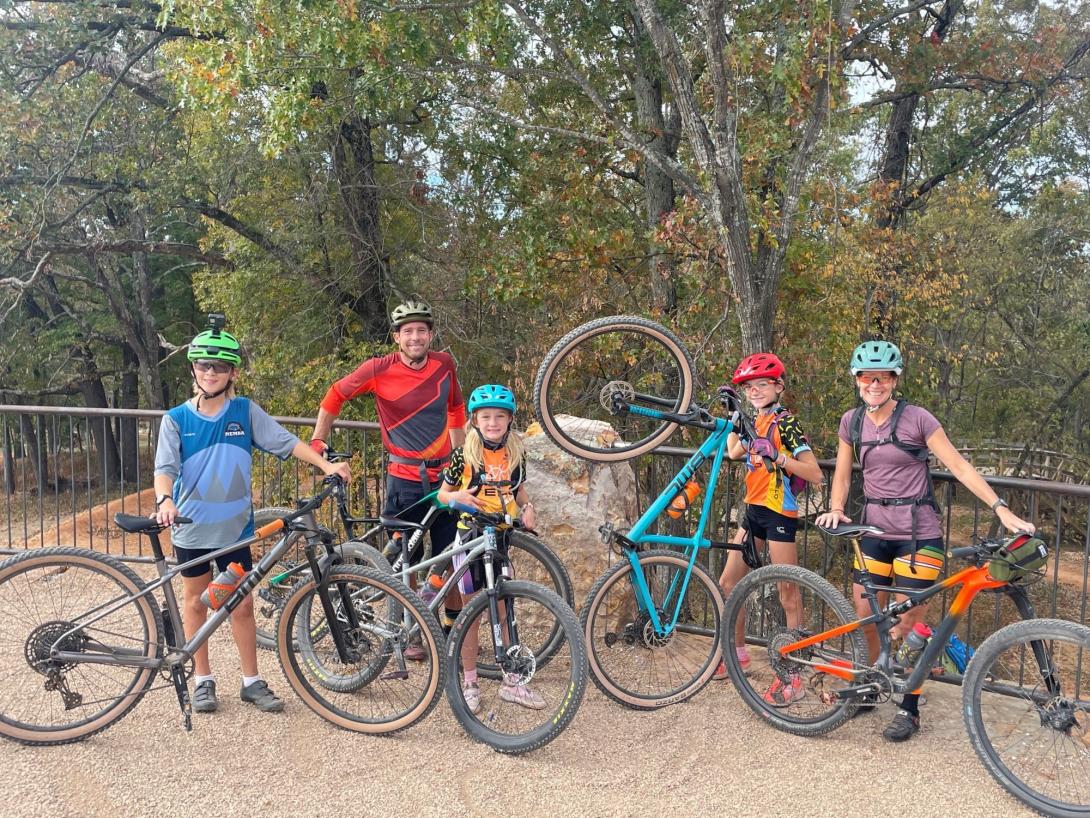Cycling for Community

EXPANDING BIKE CULTURE IN THE NAVAJO NATION

Scott Nydam ’99
Silver Stallion Bicycle and Coffee Works
Gallup, New Mexico
When former professional cyclist Scott Nydam moved with his family from California to New Mexico in 2012, he discovered there were no bike shops in the area and set out to change that, not realizing how it would spark community-wide change. Cycling is now the fastest growing sport in the Navajo Nation.
Nydam had discovered his passion for biking in his early 20s. Graduating from Calvin with a degree in sociology, he went on to intern as a school social worker in Rehoboth and Zuni, New Mexico. There he encountered what he calls the “postcolonial dilemma,” or the legacy of historic trauma against Native Americans that is “cross-generational and communally experienced.” The emotionally intense work of school counseling led him to take up cycling as a restorative pastime.
Nydam, who has attention deficit disorder, felt at home on his bike. “After a ride, I’d think, I feel amazing. The static cleared. I could focus. I think what I tapped into was the exceptional benefits of cycling.”
Nydam began entering races, joined the then-amateur racing team BMC, and by 2007, turned pro. But the career was short-lived.
After sustaining a serious brain injury from a cycling accident in 2009, his dream abruptly ended. “Being a cyclist gave me an identity I was excited about,” Nydam says, “and I really had to strip my identity from that. Walking away, not being able to even get on a bike anymore was a daily challenge.”
He continued to work for BMC in an administrative capacity, but it wasn’t the same. Nydam realized he wanted the bike in the center of his life again, so in 2018, he started a nonprofit organization called Silver Stallion Coffee and Bike Works.
“I started the coffee shop, and we merged it with a bike shop and started putting together nonprofit programs within a small business setting,” says Nydam, who partnered with a group of passionate riders from the Navajo reservation with the goal of connecting youth to all facets of mountain biking.
Nydam realized the only effective approach to this work was to involve the whole community, from businesses, schools, and parents to the kids themselves.
The group built partnerships with school social workers and physical education teachers to create the first middle school mountain biking programs for P.E. classes in the state of New Mexico.
Alongside community leaders, Silver Stallion and its local partners have also established riding clubs, racing teams, and bike mechanic programs for high school students. During the pandemic, they took their programs on the road with “Big Blue,” a van they used as a mobile ride center, bringing free bicycles and bike repair to
remote areas of the Navajo Nation.
Nydam is also a founding chair of New Mexico Interscholastic Cycling League, which offers a variety of mountain bike programs around the state, including racing teams and clubs for youth.
“Getting kids on bikes starts them on their own hero’s journey,” says Nydam. “They’re steering their own ships.” Riders learn how to negotiate difficult terrain, repair their own gear, build their own trails, and grow community with peers and mentors around a shared passion.
Inspired by the many dedicated mountain bikers he met when he moved to Gallup, Nydam knew he could meet a felt need with his bike shop, but he never imagined the unique path it would lead him down or the larger “ecosystem of healing and restoration” he would become a part of.
BUILDING CROSS-CULTURAL BRIDGES

Steve Frieswick ex’73
Baobab Bike Program
Toronto, Ontario, Canada
Steve Frieswick lives with his wife, Sandy, in a tightly knit, conservative neighborhood just outside Toronto, Ontario, the kind of neighborhood he himself grew up in, with one exception: most of his neighbors follow faiths other than Christianity.
In the early aughts, Frieswick and his family relocated from the Midwest to Toronto on a temporary basis to train for outreach work in East Africa. But temporary became permanent, and Frieswick has been serving this diverse urban community ever since.
Typical of the Toronto area, Frieswick’s neighborhood contains mixed housing, everything from large single-family homes to multiple high-rise apartment buildings that are home to many first-generation immigrants and refugees, many from East Africa.
A former teacher and an ordained pastor, Frieswick first began tutoring at an afterschool program in his neighborhood with students from 70 different language groups. In the mornings, he taught English as a second language classes to adults. As he got to know his neighbors, Frieswick witnessed first-hand the daily challenges they faced: cultural and language barriers, gang-related violence, and financial hardship due to low wages and high housing costs.
Frieswick, on the look-out for ways to share the love of Christ with his neighbors, says he had always enjoyed cycling and fixing things with his hands. The two passions merged when he saw an elderly pastor fixing bikes at the high-rises near his home. “After a year or two I didn’t see him anymore and decided it was something I could do.” That was 18 years ago.
Frieswick calls the neighborhood bike repair shop he runs from his front yard Baobab Bike Program, which stands for “being about our Brother’s awesome business.” Church and community members come alongside the Frieswicks to lend a hand, donate bikes, or volunteer to help repair them. “Sometimes the bike bunny comes by at night, and I wake up and there are three more bikes in the yard than there used to be,” he smiles.
Over the years, Frieswick has connected with countless neighbors he wouldn’t otherwise have met. In the last two years alone, he has given away close to 600 bikes and repaired hundreds more.
Still, because they are seen as outsiders, the Frieswicks’ neighbors have sometimes regarded them with suspicion. Frieswick realized his welcome depended on more than a service he could provide; it also depended on the relationships he would build and nurture for over two decades. “We’re accepted far more widely and with a whole lot less suspicion
than when we arrived,” he says. “I think most of the community still regards us as infidels, but mostly as good infidels,” he muses.
Frieswick dreams of the day when families in his neighborhood will enjoy a healthier, safer living environment. More importantly, he hopes “the community will see enough and hear enough of the love of Jesus in and through us that they’ll be hungry for the same.”
Frieswick says he experienced that capacious love at Calvin, where he says he “majored in mischief and mayhem” and where he also experienced “grace and encouragement” from the Calvin community.
“Without that demonstration of the love and grace of Jesus, particularly from Dean of Men Don Boender, I doubt that I would be where I am today.” Frieswick has made it his life’s mission to mirror that love. “We’re just working hard to teach and model just and loving relationships in our connections with our neighbors.”
RIDES FOR ALL

Jenny Los White ’03
Velo Kids
Holland, Michigan
Jenny Los White and her husband, Brad ’05, packed more than a suitcase for their Calvin semester in Spain. They brought their road bikes along, too.
“We were able to see the countryside and experience the people and culture in such a different way by bike,” White says. “You’re not just passing through a town by car, you’re actively participating in the community, talking to people in their own language, becoming part of things.”
At the time, Brad was a senior and White, who had graduated, accompanied the group as an assistant to Professor Alisa Tigchelaar. Together they participated in weekly group rides with locals—a highlight of the trip.
In 2005, the couple relocated to Colorado for work and began racing for fun. Brad, a teacher, quickly climbed the ranks within amateur cycling, leading to a nine-year career on the professional circuit that took the couple around the world.
The Whites eventually settled in Jenny’s hometown of Holland, Michigan, to raise their young family. There they purchased Velo City Cycles, a local bike shop they still run.
“We have always wanted to be an exceptional neighborhood bike shop, but we also knew selling bikes wasn’t the be-all and end-all. We knew what the bike could do and had done for us, and we wanted to share that.”
White says Velo Kids began as an offshoot of the shop, a way of connecting with other young families “out in nature on the trails.”
“It very quickly grew from 20 kids to 100 to 200 and beyond,” White says. In 2022, a group of sponsors and friends encouraged the Whites to register Velo Kids as an official nonprofit organization.
White’s mission to “get more kids on bikes, promoting and cultivating healthy, active, outdoor lifestyles” has inspired programs that teach skills, safety, and land stewardship.
Today, Velo Kids hosts summer urban and mountain bike camps, organizes community rides, and partners with local organizations such as Escape Ministries and the Boys and Girls Club of Holland to give young cyclists access to the benefits of the great outdoors.
During the summer of 2023, 50 coaches rode with over 1100 kids. White organized rides for kids navigating the Ottawa County juvenile court system—a particularly rewarding experience for both riders and coaches. “There are kids who come who are in really tough situations,” White says. “Getting on a bike and getting out in nature is a way to build confidence and healthy habits.”
Like Silver Stallion, Velo Kids recently extended its programming to partner with schools. In April 2024, Los brought her balance bike program, Little Rippers, to a primary school where 100 students learned how to ride two-wheelers for the first time. Velo Kids also hosts a “shred shed”—a kind of equipment lending library—near local Holland trails so children who want to participate in Velo Kids programs can, regardless of whether they have their own bikes and helmets.
“It’s been a wild ride,” White says. “We learn as we go. And we have an amazing staff and
just incredible community support.”
She adds, “A bike is such a simple tool, but what we’ve seen is if you can get a kid out in nature on a trail, hands on the handlebars, it’s such a thrill for them—setting goals, navigating features, experiencing a little risky play. They can go out in the world and chart their own course.”






